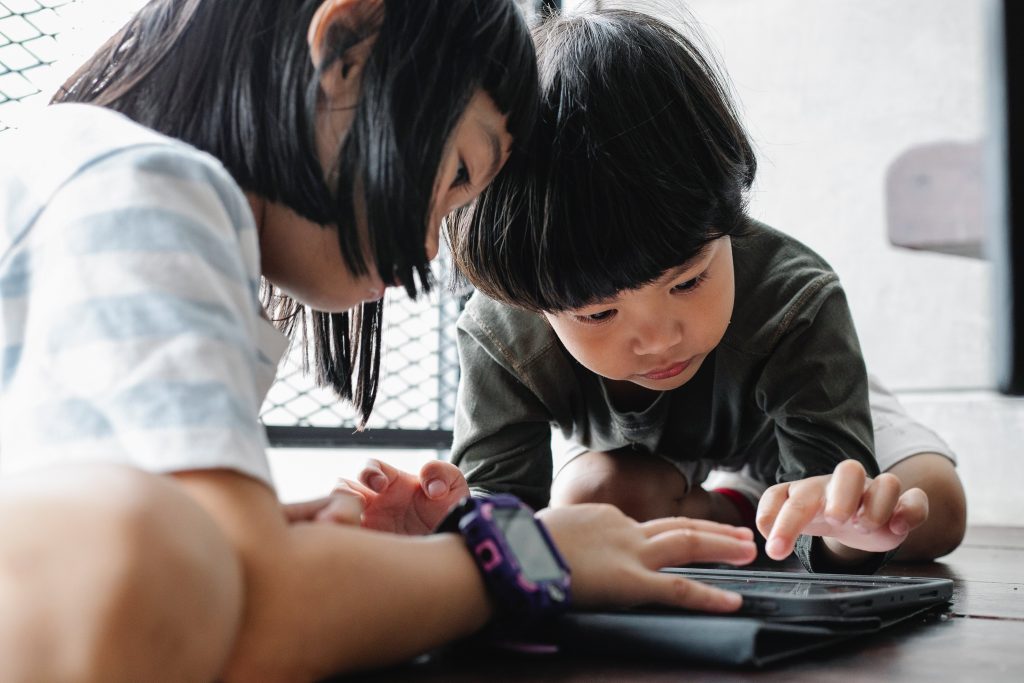
When I was 17 and working at a busy Starbucks drive-thru, it was not uncommon to be hit with the ear-piercing screams of a child in the backseat of a car as a flustered mom shouted to the microphone, “Can I PLEASE just get a cake pop?” before rolling up to the payment window. One sugary unicorn cake pop later, the screaming child would be once more happily cooing in their booster seat, and the mom could once again breathe.
This instant pacification is not limited to Starbucks cake pops—it occurs constantly nowadays with the prevalence of technology. How many of us have seen children out in public glued to their iPads filled with flashing images of Cocomelon on the go? This phenomenon has not gone unnoticed, and the term “iPad kid” is a recent addition to common language.
No doubt, this is a concerning trend. Common Sense Media found in 2020 that children between two and four years old averaged two-and-a-half hours of screen time a day, while children between five and eight years old averaged over three. We all know the dangers of the internet on developing minds, with cyberbullying, pornography, misinformation, radical political pipelines and more harm abounding. Especially since the COVID-19 quarantine, parents have been increasingly shoving screens in their children’s faces to pacify negative emotions and occupy their time.
It’s easy to shame the parents who are participating in this harmful pacification. It’s easy to write an article about parenting in the digital age that regurgitates what everyone is already saying – iPad kids are annoying and parents need to be setting more limits on their children’s screen time. Absolutely, individual parents should set more boundaries and attempt to be more intentional about teaching their children healthy coping mechanisms and offering more responses to emotional distress than Cocomelon or Roblox.
Then again, parenting is hard, and it is increasingly difficult in our world. Parents simply do not have the time or energy they once had to have the perfect response to every negative emotion their children display. The cost of living is extremely high, while wages are stagnating. According to the Economic Policy Institute, since the 1970s worker productivity has grown three times more than pay has. Parents are working more than ever to make ends meet, and the unpaid emotional labor of raising children does not sound appealing after exhausting shifts.
Moreover, child-rearing used to be the full time job of women who are now increasingly found employed in the workforce. How is it that single-income households used to be able to afford houses, cars, and college tuition, but contemporary dual-income families struggle to stay afloat?
CNBC documents that in 2023 a whopping 62% of American adults were living paycheck to paycheck. Who has time to be the most responsible and engaged parent when you’re just trying to make ends meet? Parents are forced to work long hours, occasionally even multiple jobs, and return to their household of screaming, crying children to begin the second shift of emotional labor.
Is it any wonder why iPad kids abound? Can we seriously say that we would be able to perfectly parent while battling the fatigue of staying alive? As college students without children, we could stand to empathize with the plight of parenting in the 2020s. Instead of pointing fingers, we could humble ourselves to the fact that we do not truly know the hardships of parenting.
Maybe when we feel hopeless about the prevalence of emotionally immature, unsocialized iPad kids around us, we could reach out to a parent that we know and offer our support, even if it’s a simple appreciative text. Maybe we could volunteer at schools, maybe we could offer to babysit for parents that we know. Or, more simply, maybe we could suspend our judgements and realize that we’re all doing the best we can.
